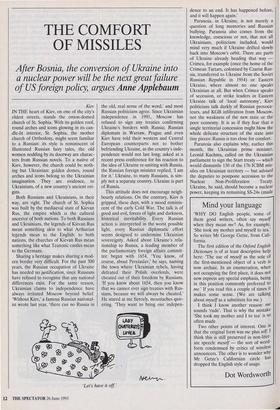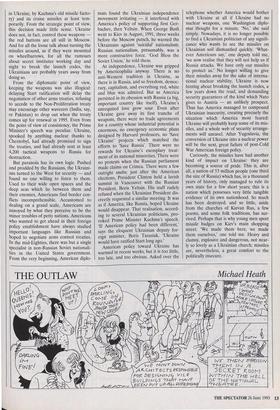THE COMFORT OF MISSILES
After Bosnia, the conversion of Ukraine into a nuclear power will be the next great failure
of US foreign policy, argues Anne Applebaum
Both Russians and Ukrainians, in their way, are right. The church of St. Sophia was built by the mediaeval state of Kievan Rus, the empire which is the cultural ancestor of both nations. To both Russians and Ukrainians, the legends of Kievan Rus mean something akin to what Arthurian legends mean to the English; to both nations, the churches of Kievan Rus mean something like what Teutonic castles mean to the Germans.
Sharing a heritage makes sharing a mod- ern border very difficult. For the past 300 years, the Russian occupation of Ukraine has needed no justification, since Russians have refused to recognise that any national differences exist. For the same reason, Ukrainian claims to independence have always irritated Moscow beyond belief. `Without Kiev,' a famous Russian national- ist wrote last year, 'there can no Russia in the old, real sense of the word,' and most Russian politicians agree. Since Ukrainian independence in 1991, Moscow has refused to sign any treaties confirming Ukraine's borders with Russia; Russian diplomats in Warsaw, Prague and even Kiev have told their western and Central European counterparts not to bother befriending Ukraine, as the country's inde- pendence would not last long; asked at a recent press conference for his reaction to the idea of Ukraine re-uniting with Russia, the Russian foreign minister replied, 'I am for it.' Ukraine, to many Russians, is sim- ply not a separatp country. Ukraine is part of Russia.
This attitude does not encourage neigh- bourly relations. On the contrary, Kiev is gripped, these days, with a mood reminis- cent of the early Cold War. The talk is of good and evil, forces of light and darkness, historical inevitability. Every Russian action is interpreted in the worst possible light, every Russian diplomatic effort seems designed to undermine Ukrainian sovereignty. Asked about Ukraine's rela- tionship to Russia, a leading member of the parliamentary foreign affairs commit- tee began with 1654. 'You know, of course, about Pereiaslav,' he says, naming the town where Ukrainian rebels, having defeated their Polish overlords, were cheated out of their freedom by Russians. 'If you know about 1654, then you know that we cannot ever sign treaties with Rus- sians, because we will always be cheated.' He stared at me fiercely, moustaches quiv- ering. 'They want to bring our indepen- `Let's have it off.' dence to an end. It has happened before, and it will happen again.'
Paranoia, in Ukraine, is not merely a question of long memories and Russian bullying. Paranoia also comes from the knowledge, conscious or not, that not all Ukrainians, politicians included, would mind very much if Ukraine drifted slowly back into Moscow's orbit. There are parts of Ukraine already heading that way Crimea, for example (once the home of the Crimean. Tartars, colonised by Czarist Rus- sia, transferred to Ukraine from the Soviet Russian Republic in 1954) or Eastern Ukraine, where almost no one speaks Ukrainian at all. But when Crimea speaks of secession, or strike leaders in Eastern Ukraine talk of 'local autonomy', Kiev politicians talk darkly of Russian provoca- teurs, and KGB infiltration from Moscow, not the weakness of the new state or the poor economy. It is as if they fear that a single territorial concession might blow the whole delicate structure of the state into tiny pieces: Russia is too close for comfort.
Paranoia also explains why, earlier this month, the Ukrainian prime minister, Leonid Kuchma, called on the Ukrainian parliament to sign the Start treaty — which would dismantle 130 of the 176 ICBM mis- siles on Ukrainian territory — but advised the deputies to postpone accession to the Nuclear Non-Proliferation Treaty. Ukraine, he said, should become a nuclear power, keeping its remaining SS-24s (made in Ukraine, by Kuchma's old missile facto- ry) and its cruise missiles at least tem- porarily. From the strategic point of view, this decision made little sense. Ukraine does not, in fact, control these weapons the red buttons are all still in Moscow. And for all the loose talk about turning the missiles around, as if they were mounted on wheelbarrows, for all the rumours about secret institutes working day and night to break the launch codes, the Ukrainians are probably years away from doing so.
From the diplomatic point of view, keeping the weapons was also illogical: delaying Start ratification will delay the negotiation of other arms treaties, refusing to accede to the Non-Proliferation treaty may encourage other waverers (India, say, or Pakistan) to drop out when the treaty comes up for renewal in 1995. Even from the point of view of consistency, the Prime Minister's speech was peculiar. Ukraine, spooked by anything nuclear thanks to Chernobyl, had already promised to sign the treaties, and had already sent at least 4,200 tactical weapons to Russia for destruction.
But paranoia has its own logic. Pushed and prodded by the Russians, the Ukraini- ans turned to the West for security — and found no one willing to listen to them. Used to their wide open spaces and the deep seas which lie between them and their enemies, Americans find border con- flicts incomprehensible. Accustomed to dealing on a grand scale, Americans are annoyed by what they perceive to be the minor troubles of petty nations. Americans who wanted to get ahead in their foreign policy establishment have always studied Important languages like Russian and hoped to negotiate arms control treaties. In the mid-Eighties, there was but a single specialist in non-Russian Soviet nationali- ties in the United States government. From the very beginning, American diplo- mats found the Ukrainian independence movement irritating — it interfered with America's policy of supporting first Gor- bachev, then Yeltsin. When George Bush went to Kiev in August, 1991, three weeks before the Moscow putsch, he warned the Ukrainians against 'suicidal' nationalism; Russian nationalism, presumably, was a more constructive force. 'God Bless the Soviet Union,' he told them.
At independence, Ukraine was gripped by Americophilia anyway. There is no anti-Western tradition in Ukraine, as there is in Russia, and so freedom, democ- racy, capitalism, and everything red, white and blue was admired. But as America persisted in its obession with Russia (a big, important country like itself), Ukraine's unrequited love grew sour. Even after Ukraine gave away its first tranche of weapons, there were no trade agreements for a country whose industrial potential is enormous, no emergency economic plans designed by Harvard professors, no 'Save Ukraine' projects which matched the efforts to 'Save Russia'. There were no rewards for Ukraine's exemplary treat- ment of its national minorities. There were no protests when the Russian parliament made claims on Crimea. There were a few outright snubs: just after the American elections, President Clinton held a lavish summit in Vancouver with the Russian President, Boris Yeltsin. His staff rudely refused when the Ukrainian President dis- creetly requested a similar meeting. It was as if America, like Russia, hoped Ukraine would disappear. That realisation, accord- ing to several Ukrainian politicians, pro- voked Prime Minister Kuchma's speech. 'If American policy had been different,' says the eloquent Ukrainian deputy for- eign minister, Boris Tarasiuk, 'Ukraine would have ratified Start long ago.'
American policy toward Ukraine has warmed in recent weeks, but it is too little, too late, and too obvious. Asked over the telephone whether America would bother with Ukraine at all if Ukraine had no nuclear weapons, one Washington diplo- mat thought for a minute. 'No,' she said simply. Nowadays, it is no longer possible to find a Ukrainian politician of any signifi- cance who wants to see the missiles on Ukrainian soil dismantled quickly. 'What- ever Americans say,' one deputy told me, 'we now realise that they will not help us if Russia attacks. We have only our missiles to protect us.' No longer willing to give their missiles away for the sake of interna- tional nuclear stability, Ukraine is now hinting about breaking the launch codes, a few years down the road, and demanding security guarantees of the kind which Nato gives to Austria — an unlikely prospect. Thus has America managed to compound Ukrainian insecurity, creating precisely the situation which America most feared: Ukraine will probably keep some of its mis- siles, and a whole web of security arrange- ments will unravel. After Yugoslavia, the conversion of Ukraine into a nuclear power will be the next, great failure of post-Cold War American foreign policy.
Curiously, the missiles have had another kind of impact on Ukraine: they are becoming a source of pride. This is, after all, a nation of 53 million people (one third the size of Russia) which has, in a thousand years of history, only managed to rule its own state for a few short years; this is a nation which possesses very little tangible evidence of its own nationhood. So much has been destroyed, and so little, aside from the churches of Kievan Rus, a few poems, and some folk traditions, has sur- vived. Perhaps that is why young men sport missile badges on Kiev's main shopping street. 'We made them here, we made them ourselves,' one told me. Heavy and clumsy, explosive and dangerous, not near- ly so lovely as a Ukrainian church; missiles are, nevertheless, a great comfort to the politically insecure.



























































 Previous page
Previous page